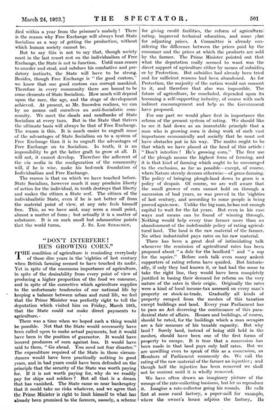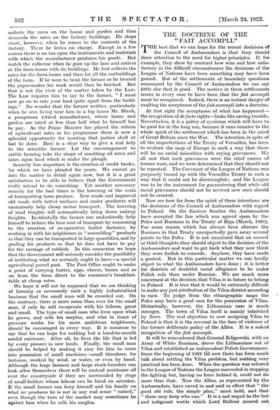"DON'T INTERFERE I HE'S GROWING CORN."
THE condition of agriculture is reminding everybody of those 'dire years in the 'eighties of last century when British farming seemed to have touched its nadir. Yet in spite of the enormous importance of agriculture, in spite of the desirability from every point of view of producing a higher proportion of the food we consume, and in spite of the corrective which agriculture supplies to the unfortunate tendencies of our national life by keeping a balance between urban and rural life, we feel that the Prime Minister was perfectly right to tell the deputation which visited him on Friday, March 16th, that the State could not make direct payments to agriculture. • • There was a time when we hoped such a thing would be possible. Not that the State would necessarily have been called upon to make actual payments, but it would have been in the position of guarantor. It would have insured producers of corn against loss. It would have said to them, " Go ahead. You need not fear disaster." The expenditure required of the State in those circum- stances would have been practically nothing in good years, and in bad years could have been defended on the principle that the security of the State was worth paying for. If it is not worth paying for, why do we readily pay for ships and soldiers ? But all that is a dream that has vanished. The State came so near bankruptcy that it could take no risks whatever, and we agree that the Prime Minister is right to limit himself to what. has -already been promised. to the farmers, namely, a scheme for giving credit facilities, the reform of agricultural rating,' improved technical education, and some plan for adjusting prices. A Committee is already con- sidering the difference between the prices paid by the consumer and the prices at which the products are sold by the farmer. The Prime Minister pointed out that what the deputation really seemed to want was the direct support of agriculture either by means of subsidies or by Protection. But subsidies had already been tried and for sufficient reasons had been abandoned. As for Protection, the majority of the nation would not consent to it, and therefore that also was impossible. The future of agriculture, he concluded, depended upon its becoming a self-supporting industry, of course with such indirect encouragement and help as the Government have proposed.
For our part we would place first in importance the reform of the present system of rating. We should like to see it laid down as an immutable principle that a man who is growing corn is doing work of such vast importance economically and socially that he must not have obstacles put in his way. The motto ought to be that which we have placed at the head of this article : " Don't interfere ! He's growing corn." The free use of the plough means the highest form of farming, and it is that kind of farming which ought to be encouraged to the exclusion, as far as possible—except, of course, where Nature sternly decrees otherwise—of grass-farming. The policy of bringing plough-land down to grass is a policy of despair. .Of course, we are well aware that the small grower of corn cannot hold on through a succession of bad years, as was proved in the 'eighties of last century, and according to some people is being proved again now. Unlike the big man, he has not enough capital to wait for the fat years. But even in his case ways and means can be found of winning through. Nothing would help every true farmer more than an abandonment of the indefensible policy of rating agricul- tural land. The land is the raw material of the farmer. No other industrialist pays rates on his raw material.
There has been a great deal of intimidating talk whenever the remission of agricultural rates has been proposed about " a dole for the landlord " and " a sop for the squire." Before such talk even many ardent supporters of rating reform have quailed. But historic- ally, if only they had known it, or had had the sense to take the right line, they would have been completely justified in basing their demand for reform on the very nature of the rates in their origin. Originally the rates were a kind of local income-tax assessed on every man's property or stock-in-trade. Gradually all kinds of property escaped from the meshes of this taxation except buildings and land. Every year Parliament has to pass an Act decreeing the continuance of this para- doxical state of affairs. Houses and buildings, of course, should be rated, for the buildings which a man occupies are a fair measure of his taxable capacity. But why land ? Surely land, instead of being still held in the meshes, should have been one of the first forms of property to escape. It is true that a concession has been made in that land pays only half rates. But we are unwilling even to speak of this as a concession, as Members of Parliament commonly do. We call the rating of the raw material of the farmer an injustice ; and though half the injustice has been removed we shall not be content until it is wholly removed.
We have often drawn an imaginary picture of the wrongs of the rate-collecting business, but let us reproduce it. Imagine a rate-collector going his rounds. He calls first at some rural factory, a paper-mill for example, where the owner's house adjoins the factory. He collects the rates on the house and garden and then demands the rates on the factory buildings. He stops short, however, when he comes to the contents of the factory. There he levies no charge. Except in a few unions there is- no tax upon the instruments and materials with which the manufacturer produces his goods. But watch the collector when he goes up the lane and arrives at the farm-house with its buildings. He first collects the rates for the farmhouse and then for all the outbuildings of the farm. If he were to treat the farmer as he treated the paper-maker his work would then be finished. But that is not the view of the matter taken by the Law. The Law requires him to say to the farmer, " I must now go on to rate your land quite apart from the build- ings." No- wonder• that the farmer writhes, particularly when he sees living near him in a big house Mr. Blank, a prosperous retired manufacturer, whose house and garden are rated at less than half what he himself has to pay. As the Prime Minister has placed the reform of agricultural rates in his programme there is now a• splendid opportunity for insisting that justice shall at last be done. Here is a clear way to give a real help to the scientific farmer. Let the encouragement to arable farming take the shape of remitting all rates and taxes upon land which is under the plough.
Scarcely less important is the creation of credit banks, for which we have pleaded for years. We cannot go into the matter in detail again now, but it is a great satisfaction to be able to believe that the Government really intend to do something. Yet another necessary remedy for the bad times is the lowering of the costs of transporting farm produce. New roads and improved old roads with better surfaces and easier gradients will enormously help cheap motor transport. The lowering of road: freights will automatically bring down railway freights.. Incidentally the farmer can undoubtedly help himself to reduce the true cost of transport by consenting to the creation- of co-operative butter factories, by working in with his neighbours in "assembling" products so that they can be transported in large quantities, and by grading his products so that he does not have to pay for the carriage of rubbish. In this connexion we hope that the Government will seriously consider the possibility of instituting what we certainly ought to have—a special agricultural parcel post. The Post Office ought to make a point of carrying butter, eggs, cheese, bacon and so on from the farm direct to the consumer's breakfast- table at cheap rates.
We hope it will not be supposed that we are thinking of farming as necessarily such a highly industrialized business that the small man. will be crowded out. On the contrary, there is more room than ever for the small man, if only he will co-operate with his fellows, great and small. The type of small man who lives upon what. he grows, and sells his surplus, and who in times of pressure works for his more ambitious neighbours, should be encouraged in every way. It is nonsense to say that he can hope for nothing but a hand-to-mouth sordid existence. After all, he lives the life that is led: by every pioneer in new lands. Finally, the small man should be helped by making it easy for him to come into possession of small machines—small threshers, for instance, worked by wind, or water, or even by hand Although the large farmers and large stock-breeders can look after themselves there will be mutual assistance all over the countryside if they are surrounded by rings of small-holders whose labour can be hired on occasion. If the small farmer can keep himself and his family on what he produces he is not in any real sense " ruined,." even though the turn of the market may sometimes be against him when he sells his surplus.



































































 Previous page
Previous page